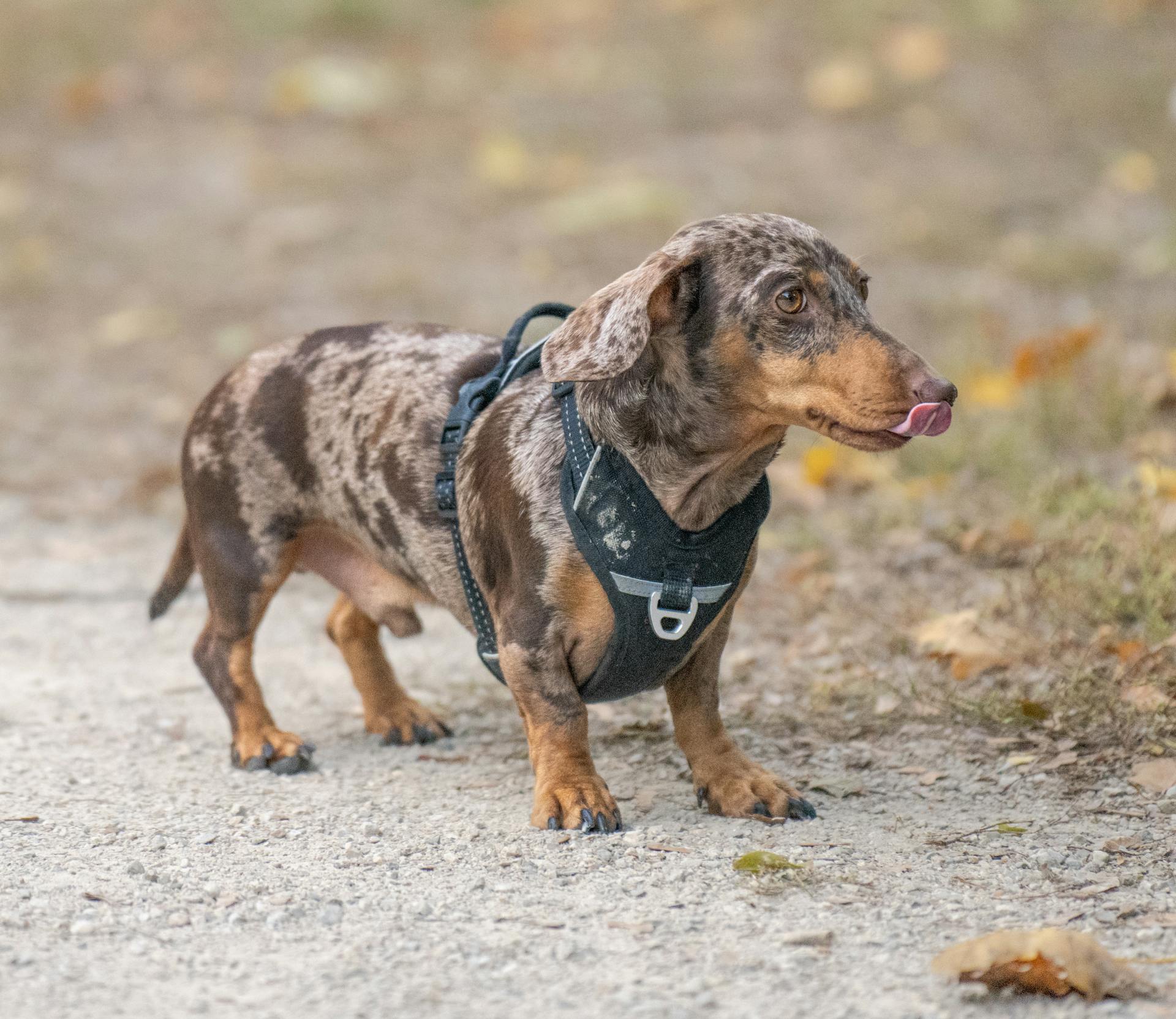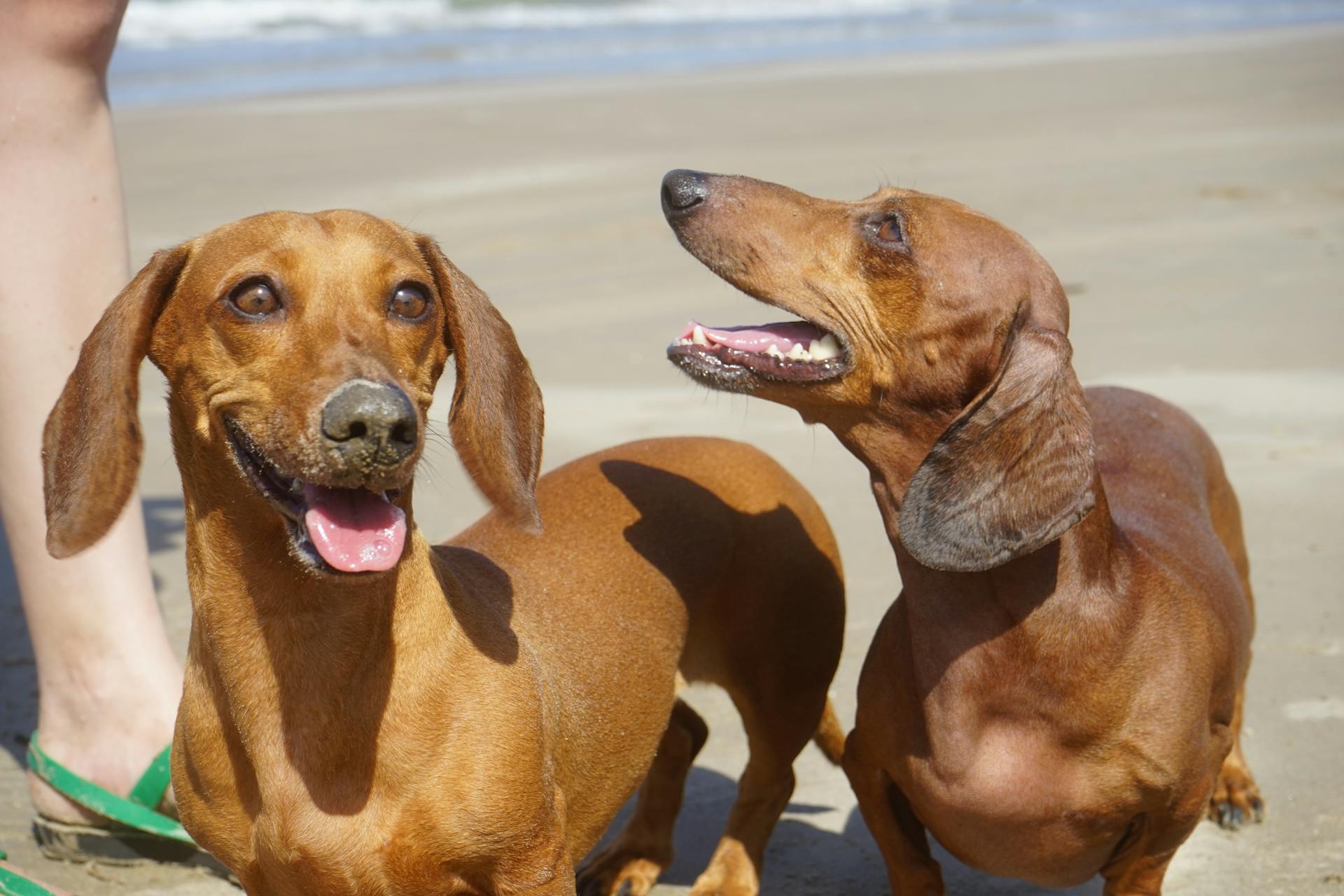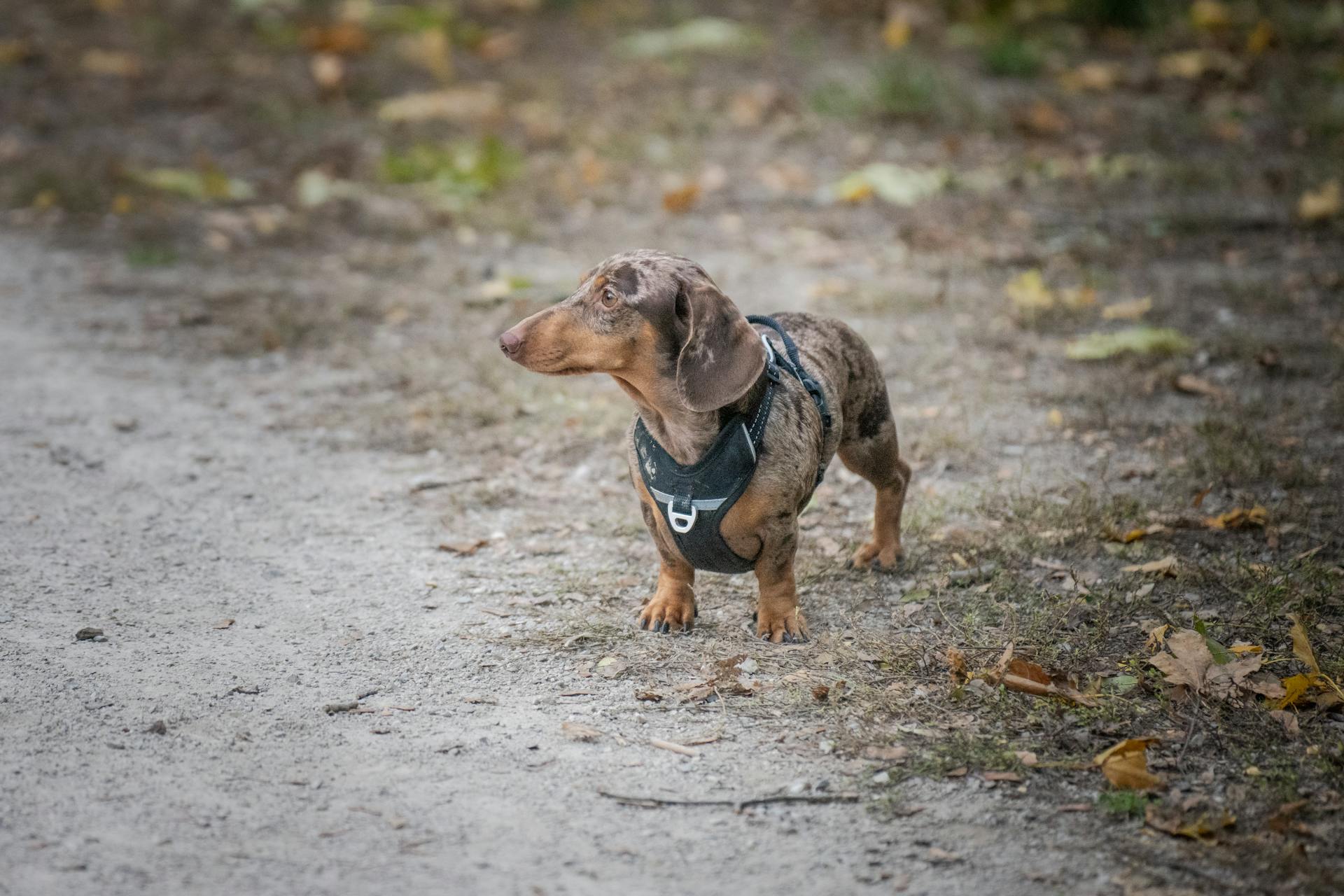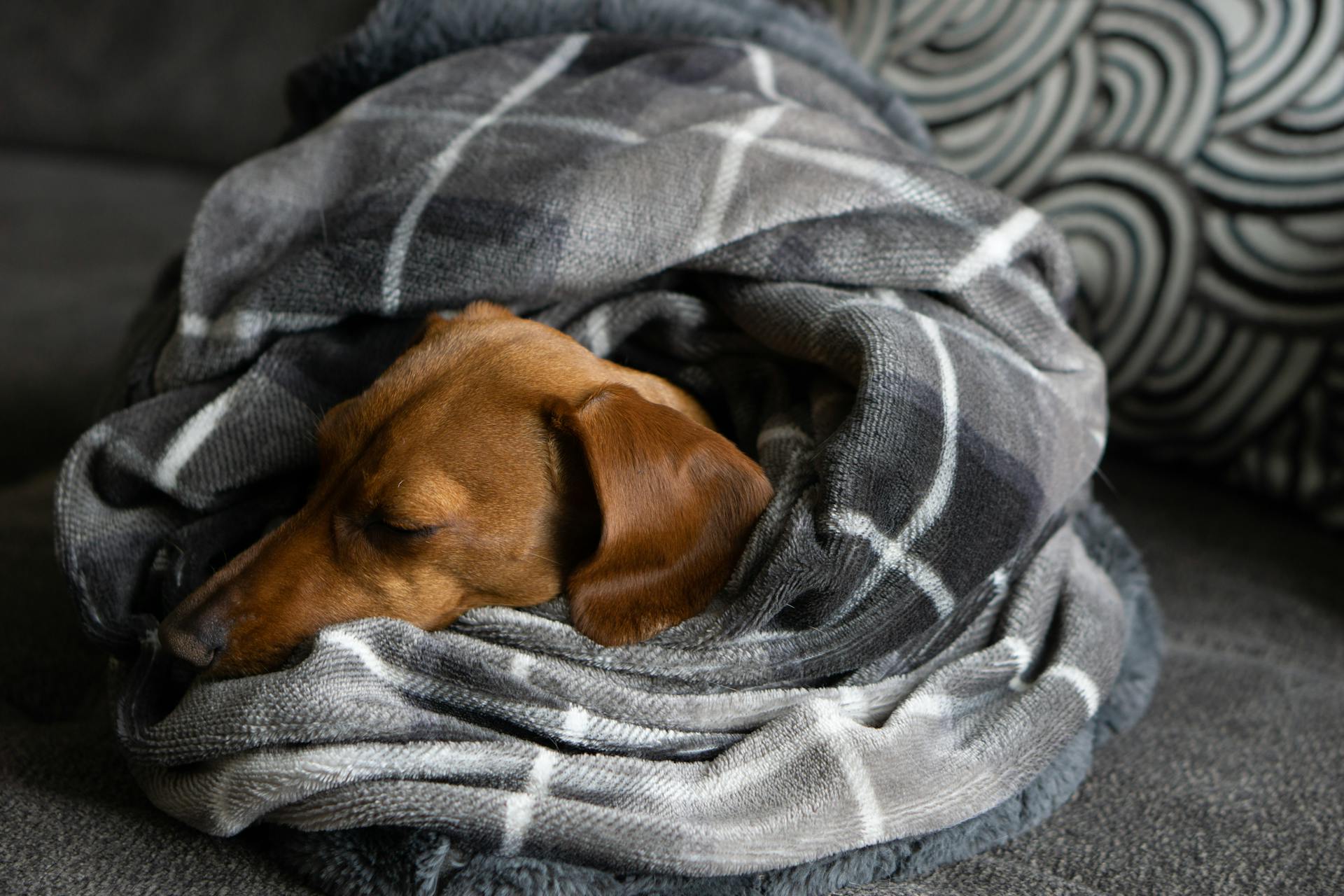
Owning a Doxiepoo can be a thrilling experience, but it's essential to know what to expect from a full-grown Doxiepoo.
Doxiepoos typically weigh between 10-20 pounds and stand 10-14 inches tall. They have a short, smooth coat that requires minimal grooming.
As a hybrid breed, Doxiepoos inherit the best traits from their parent breeds, the Dachshund and the Poodle. This mix of characteristics makes them an excellent choice for many families.
Doxiepoos are generally friendly and outgoing, but they can be wary of strangers, making socialization a crucial aspect of their upbringing.
Readers also liked: Golden Doxiepoo
The Temperament of Doxiepoos
Doxiepoos are known for their friendly, affectionate, and playful nature, making them excellent companions for families, singles, and seniors alike.
They are intelligent and eager to please, which makes them relatively easy to train, although they may also inherit the stubbornness and bullheadedness of their Dachshund parents.
These dogs are typically good with children and other pets, but early socialization is vital to ensure they get along well with others.
Doxiepoos have big personalities and won't shy away from being in the spotlight, and they love receiving affection and giving affection in return.
They form strong bonds with their families and love being included in all family activities, which makes them a popular breed for families.
Their energy level can vary, but most are moderately energetic and enjoy regular walks and play sessions, which is essential for their physical and mental health.
Some Doxiepoos may also inherit the Dachshund's hunting instincts, so keeping an eye on them around small animals and children is essential.
Providing plenty of mental stimulation is crucial to keep them entertained and prevent boredom, which can lead to destructive behavior.
Doxie Poos Vary Greatly in Size and Appearance
Doxie Poo sizes can vary greatly depending on the size of the Poodle parent. They can range from 10 to 30 pounds in weight.
Some Doxiepoos can be as small as 5 inches tall, while others can reach up to 15 inches tall. This wide range in size is due to the different sizes of Dachshunds and Poodles that can be used to create a Doxiepoo.
Dachshunds come in two sizes: Miniature and Standard. The Doxiepoo's size can vary depending on whether it inherits more traits from the Dachshund or the Poodle parent.
Here's a breakdown of the different types of Dachshunds and Poodles that can create a Doxiepoo:
The Doxiepoo's full-grown size can be anywhere from 5-15 inches tall at the shoulder and 6-30 pounds in weight.
Coat & Colors
The Doxiepoo's coat is one of its most distinctive features, combining the curly, soft coat of a Poodle with the short, smooth coat of a Dachshund.
Their coat type can vary greatly, from short and wavy to long and curly, making it hard to predict what type they'll have based on their parents.
Doxiepoos come in a wide range of colors, including black, brown, liver, chocolate, gray, red, white, and cream.
Some Doxiepoos can have coats of more than one color, with different markings and subtle patterns like dapple, brindle, and sable.
Not all Doxiepoos inherit the Poodle's lower shedding, hypoallergenic coat, as mixed breeds can be unpredictable.
Additional reading: Standard Male Poodle
Training
Doxiepoos are generally quick learners and respond well to positive reinforcement methods.
They're intelligent and eager to please, so they typically respond well to positive reinforcement training methods like treats, cuddles, and toys.
Consistency and patience are critical, as some may inherit the stubbornness of their Dachshund parent.
Early training and socialization when they're young are important to ensure your Dachshund Poodle mix is comfortable around new people, animals, and new environments.
Doxie Poos do best when training sessions are kept short and fun, and many owners find success when they schedule multiple short obedience training sessions throughout the day.
Smaller Doxie Poos may have a more challenging time with potty training than larger Doxie Poos.
They have smaller bladders and require being let out more frequently, but with some time and patience, your Doxie Poo will learn to go outside to potty.
Related reading: Full Grown Mini Dapple Dachshund
Health and Conditions
Doxiepoos are generally healthy dogs, but like all breeds, they can be prone to certain health issues as they age. They can live quite a long time, 10 to 15 years or more.
Hip dysplasia and patella luxation are two common health issues that can affect Doxiepoos. Regular exercise and a healthy diet can help prevent or manage these conditions.
Eye and vision problems are also a concern for Doxiepoos, as well as back injuries and heart problems. Early detection and treatment are key to preventing these issues from escalating.
Here are some specific health issues that Doxiepoos may experience:
- Hip dysplasia
- Patella luxation
- Thyroid issues
- Addison’s disease
- Eye and vision problems
- Back injuries
- Legg-Calve-Perthes (a hip condition)
- Heart problems
- Ear infections
Intervertebral Disc Disease (IVDD) is a major problem seen in some Doxiepoos, especially those with a Dachshund parent. Regular check-ups with your veterinarian can help detect any potential issues early on.
Healthy Doxiepoos are known to live for 12-15 years, depending on their size. Smaller dogs generally live longer.
Care and Maintenance
Doxie Poos require daily brushing to prevent their coats from matting, especially if they have a coat similar to a Poodle's.
A bath every 4-6 weeks is usually sufficient for most Doxie Poos, but overbathing can cause skin and coat dryness.
Regular grooming sessions with a professional every 6-8 weeks can help keep their coats manageable and prevent matting.
Grooming
Doxie Poos require daily brushing to prevent their coats from matting, especially if they have a coat type similar to a Poodle's.
Their coats can grow fairly long, so regular trims at a professional groomer every 6-8 weeks can make a big difference in their overall appearance and manageability.
Missing a day of brushing is okay for Doxie Poos with wavier coats, but regular brushing is still necessary to prevent matting.
Bathing every 4-6 weeks is a good frequency for most Doxie Poos, depending on their activity level.
Overbathing can cause their skin and coat to dry out and lead to skin irritation, so it's essential to find a balance.
Feeding Guide
When feeding your Doxie Poo, it's essential to consider their age, size, and activity level. Your veterinarian can help determine the best diet for your dog.
Doxie Poos are generally healthy, so they don't require special diets, but a high-quality dog food is still a must.
Here's an interesting read: Full Grown Black Samoyed Dog
As your Doxie Poo ages, they may develop hip and joint issues, so adding bone and joint supplements can be beneficial.
A diet rich in protein with meats like chicken, turkey, fish, and lamb is a good starting point for most Doodles.
You can also consider adding raw meaty bones and vegetables to their diet for added nutrition.
Doxie Poos have sensitive digestion, so it's best to avoid foods that contain dairy, grains like wheat or corn, fillers, and artificial ingredients.
Consult a vet nutritionist to find the right food for your Doxie Poo, and consider a hypoallergenic and grain-free diet or homemade food for optimal results.
Raw dog food or special vet-prescribed foods can also be a good option for sensitive dogs.
Worth a look: Shih Poo Fully Grown
Ownership
As a doxiepoo owner, you'll want to know that they are generally considered to be the owner's dog, not a pet that belongs to the family.
Doxiepoos are known to be loyal and loving companions, often forming strong bonds with their owners.
In fact, research suggests that doxiepoos will often follow their owner's lead and respond to their commands, making them easy to train.
Breeders & Costs
If you're considering bringing a Dachshund Poodle mix into your family, be prepared for a wide range of costs. The cost for one of these adorable pups can vary greatly, ranging from $250 to $2,000, depending on the bloodline and pedigree of their parents.
Always look for reputable breeders, and don't be afraid to ask questions about the parent dogs, previous litters, and what health screenings are performed. This will help ensure you're getting a healthy pup from a responsible breeder.
Initial setup costs can add up, too, with primary expenses including crates, food, toys, blankets, and puppy pads.
Doxiepoo Ownership Essentials
Doxiepoos are cute, cuddly, and compact dogs, having Poodle genes that make them fairly easy to train.
Their trainability is an advantage, especially considering the Dachshund breed's known stubborn streak.
The Doxiepoo's appearance is not predictable due to its hybrid nature, making each dog unique.
They're a result of crossing a Dachshund with a Toy or Miniature Poodle, a trend that began with the creation of the first Doodle mix in the 1990s.
The Doxiepoo is not registered with the Australian Kennel Club, but the American Canine Hybrid Club tracks its parentage in the USA.
In Australia, similar associations keep a record of the heritage of hybrid dog breeds like the Doxiepoo.
A fresh viewpoint: Dog Run
Puppy Growth
Most Doxiepoos weigh between 5 and 30 lb.
Doxiepoo puppies can grow to be quite small, measuring 5-15 inches at the withers.
Their coat can be curly, tight, short, long, wavy, or smooth, and it may resemble that of a Poodle or a Dachshund.
Doxiepoos come in a wide range of coat colors including red, tan, cream, white, black, beige, liver, brown, chocolate, merle, pied, parti, phantom, and combinations thereof.
Their genetics can be quite complex, making each puppy unique and unpredictable.
Frequently Asked Questions
Are doxiepoos rare?
Yes, Doxiepoos are relatively rare due to their unique breed combination. You may not often encounter them at the dog park or in local shelters.
Sources
- https://vetplayas.com/doxiepoo-dachshund-poodle-mix-traits-care-more/
- https://www.dogster.com/dog-breeds/doxiepoo
- https://rockykanaka.com/the-doxiepoo-little-legs-and-a-big-personality/
- https://raggydogs.com.au/blog/%EF%BF%BCdoxiepoo-dachshund-poodle-mix-everything-you-need-to-know/
- https://www.dogbreedinfo.com/doxiepoo.htm
Featured Images: pexels.com


